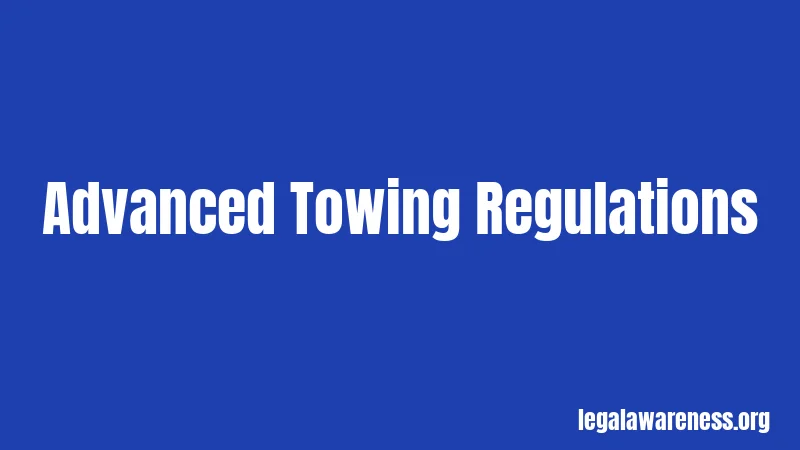RV Laws in Texas (2026): Everything You Need to Know
Texas welcomes RV enthusiasts with open arms. The state offers friendly laws for RV owners and travelers. This guide covers everything you need to know about RV laws in Texas this year.
Whether you’re planning a weekend trip or full-time RV living, understanding Texas laws will keep you safe and legal.
What Are RV Laws?

RV laws cover rules for driving, parking, and living in recreational vehicles. These laws protect everyone on the road and in communities. They cover towing limits, speed restrictions, and where you can park.
Texas has state-level laws that apply everywhere in the state. Cities and counties can also make their own rules. This means laws can be different in different places.
Basic RV Towing Laws
Size and Weight Limits
Texas has clear rules about RV size and weight. Your RV cannot be taller than 14 feet. The width limit is 8 feet 6 inches.
For length, a single motorhome can be up to 40 feet long. A towing vehicle pulling a trailer cannot exceed 65 feet total length. This includes both the truck and the RV.
If your RV is heavier than 26,000 pounds, you may need a special license. Most regular RVs don’t reach this weight. Check with the Texas Department of Public Safety if you’re unsure.
Speed Limits for Towing
Speed limits are different when you’re towing an RV. On most Texas highways, you can drive 70 mph during the day. At night, the speed limit drops to 65 mph.
Fifth wheel trailers have stricter limits. During the day, you can only drive 60 mph. At night, the limit is 55 mph.
These lower speeds keep everyone safer. RV tires and equipment aren’t designed for high speeds. Following speed limits prevents accidents and tire problems.
Required Safety Equipment
Texas requires specific safety equipment when towing. You must have safety chains connecting your RV to your tow vehicle. These chains must be strong enough to handle the full weight of your RV.
Trailers over 3,000 pounds must have brakes. Trailers over 3,000 pounds also need breakaway switches. This device stops the trailer if it comes loose from your truck.
You need reflective signs or flares in your RV. A fire extinguisher is suggested but not required by law.
Advanced Towing Regulations

Triple Towing Rules
Texas does not allow triple towing. You cannot pull two trailers behind one vehicle. This rule keeps roads safer and prevents accidents.
You can only tow up to three vehicles using the saddle-mount method. This special technique is mainly used by professional vehicle transporters.
Passenger Rules
Children under 18 cannot ride in a flatbed trailer. This rule protects young passengers from serious injuries.
In most trailers, passengers cannot ride while the vehicle is moving. The exception is pickup campers and fifth wheels with special safety equipment.
Fifth wheels can have passengers if they have safety glass windows. They also need a working communication system with the tow vehicle.
RV Registration and Inspections
2025 Inspection Changes
Big news for 2025! Texas eliminated most vehicle safety inspections starting January 1, 2025. This includes RVs and travel trailers.
You no longer need an annual safety inspection for your RV. However, you still pay a $7.50 inspection program replacement fee when you register.
Some counties still require emissions testing. These include major metro areas like Dallas, Houston, and Austin. Check with your county to see if emissions testing applies to you.
Registration Requirements
You must register your RV in the county where you live. Registration happens annually and includes paying fees and taxes.
For RV registration, you need proof of ownership and insurance. If your RV weighs over 4,000 pounds, it must have a title.
Trailers over 7,500 pounds can use self-certification. You fill out a form saying your RV is safe instead of getting an inspection.
Parking and Living Laws

Residential Area Parking
Texas doesn’t have statewide rules about parking RVs in neighborhoods. Each city and county makes its own rules. Many places have different requirements.
Most cities allow you to park an RV on your own property. The RV must be on a hard surface like concrete or asphalt. Parking on grass is often not allowed.
Some cities require RVs to be parked behind the front line of your house. Others require fencing or screening to hide the RV from view.
Street Parking Rules
Street parking rules vary by city. Many Texas cities limit how long you can park an RV on the street. Common time limits include 24 hours, 72 hours, or one week.
Austin has a 72-hour rule for oversized vehicles. Houston uses a 24-hour limit. Dallas suburbs often have similar short-term limits.
Some cities allow longer parking with permits. Others ban RV street parking completely in residential areas. Always check local rules before parking.
Full-Time RV Living
Living in an RV full-time is legal in Texas. You can live on private property if you own the land or have permission. You must follow all local zoning rules and building codes.
Many RV parks welcome long-term residents. If you stay over 30 days, you may have tenant rights under Texas law. This gives you some eviction protection.
Texas is popular for full-time RV living because there’s no state income tax. Many people establish Texas residency for tax benefits.
Penalties and Consequences
Towing Violations
Breaking towing laws can result in fines and tickets. Overweight or oversized vehicles face bigger penalties. Officers can require you to unload cargo or get permits.
Speed violations while towing carry standard traffic fines. Repeat offenses may affect your driver’s license. Serious violations can lead to license suspension.
Safety equipment violations typically result in fix-it tickets. You get time to add missing equipment before facing fines.
Parking Violations
Parking violations usually start with warnings in most cities. Code enforcement gives property owners time to fix problems before issuing tickets.
Fines for parking violations range from $50 to $500 depending on the city. Repeat violations face higher penalties. Some cities can tow illegally parked RVs.
Street parking violations are often handled like regular parking tickets. Fines typically range from $25 to $200.
Special Circumstances
RV Parks and Campgrounds
Texas has over 376 RV parks, more than any other state. New building standards may be required starting in 2025. The Texas Association of Campground Owners is pushing for uniform safety standards.
Private RV parks set their own rules for stays and fees. State parks typically have 14-day stay limits. Some allow longer stays with permits.
National forests in Texas allow dispersed camping. This means you can park your RV on public land for free. Stay limits are usually 14 days before you must move.
Rest Area Rules
Texas rest areas allow vehicles to stay up to 24 hours. This gives you time to rest safely during long trips. Setting up camping equipment is not allowed.
You cannot extend slide-outs or set up chairs and tables. These activities turn resting into camping, which is prohibited. Keep your setup minimal and temporary.
HOA and Deed Restrictions
Homeowner associations can restrict RV parking even if the city allows it. Many HOAs require RVs to be stored behind fences or off-site. Some ban visible RV storage completely.
Always check HOA rules before buying a home or parking an RV. These private agreements override city permissions. Violations can result in fines or legal action.
Some HOAs provide community RV storage areas. These lots keep peace with neighbors while allowing convenient access.
How to Stay Compliant
Before You Travel
Check local laws for every city you plan to visit. Rules change frequently, especially parking regulations. City websites usually list current RV rules.
Make sure your RV meets size and weight requirements. Measure height, width, and length accurately. Include any accessories or equipment in your measurements.
Verify your towing vehicle can safely handle your RV weight. Don’t exceed manufacturer ratings for towing capacity or tongue weight.
Insurance Requirements
Texas requires minimum liability insurance for motorhomes. You need $30,000 per person, $60,000 per accident, and $25,000 for property damage.
Many RV owners choose higher coverage amounts. RVs are expensive to repair and replace. Comprehensive coverage protects against theft and weather damage.
Travel trailers need insurance if financed. Even paid-off trailers benefit from coverage. Liability insurance protects you if your RV causes an accident.
Staying Updated
RV laws change regularly as cities update ordinances. Follow local news and RV forums for updates. The Texas RV community is active and shares information quickly.
Join Texas RV associations for the latest news. These groups track law changes and advocate for RV-friendly policies. They often provide legal updates to members.
Contact city code enforcement with questions. Most offices provide helpful information about local rules. Getting answers directly prevents misunderstandings.
Frequently Asked Questions
Can I park my RV on the street overnight in Texas?
It depends on your city’s rules. Texas has no statewide ban on RV street parking. Most cities allow short-term parking from 24 to 72 hours. Always check local ordinances before parking overnight.
Do I need a special license to drive an RV in Texas?
Most RV drivers only need a regular driver’s license. You need a commercial license if your RV weighs over 26,000 pounds. This applies to very large motorhomes and some heavy trailers.
Are RV inspections still required in 2025?
No, Texas eliminated safety inspections for most RVs starting January 1, 2025. You still pay a $7.50 replacement fee when registering. Some counties still require emissions testing for air quality.
Can I live in my RV on my own property?
Usually yes, but check local zoning rules first. Most Texas cities allow RV living on private property. You may need to park on a hard surface and follow setback requirements. Some areas require permits for long-term occupancy.
What’s the maximum speed limit when towing in Texas?
It depends on your RV type and time of day. Regular trailers can go 70 mph during day and 65 mph at night. Fifth wheels are limited to 60 mph during day and 55 mph at night. Always follow posted speed limits which may be lower.
Final Thoughts
Texas offers some of the most RV-friendly laws in the United States. The elimination of safety inspections in 2025 makes RV ownership even easier. Low taxes and warm weather add to the appeal.
Remember that local laws can be stricter than state laws. Always research rules for specific cities and counties you plan to visit. When in doubt, contact local officials for guidance.
Texas welcomes RV travelers and residents with open arms. Following these laws keeps you safe and legal while enjoying the Lone Star State’s many attractions.
